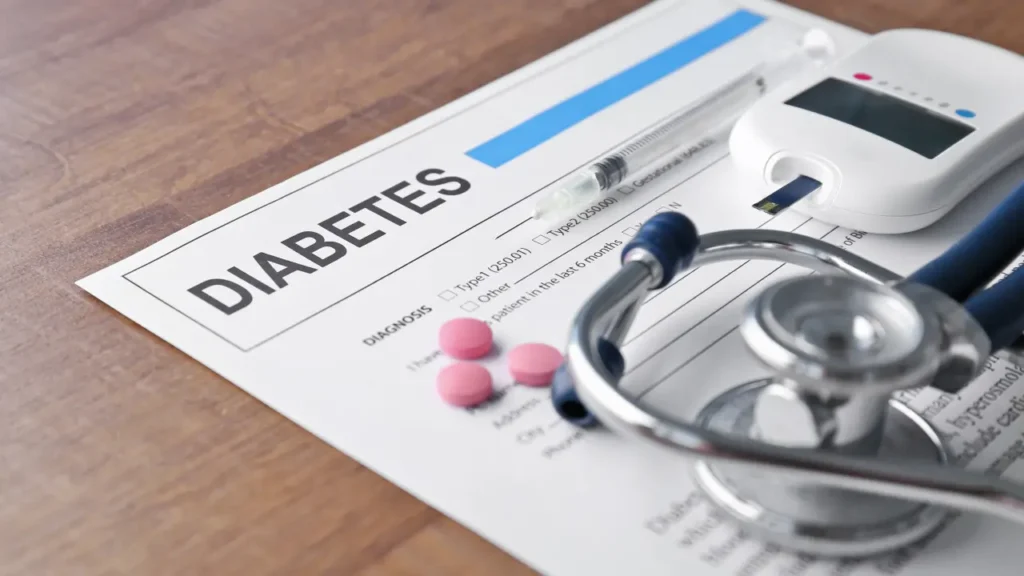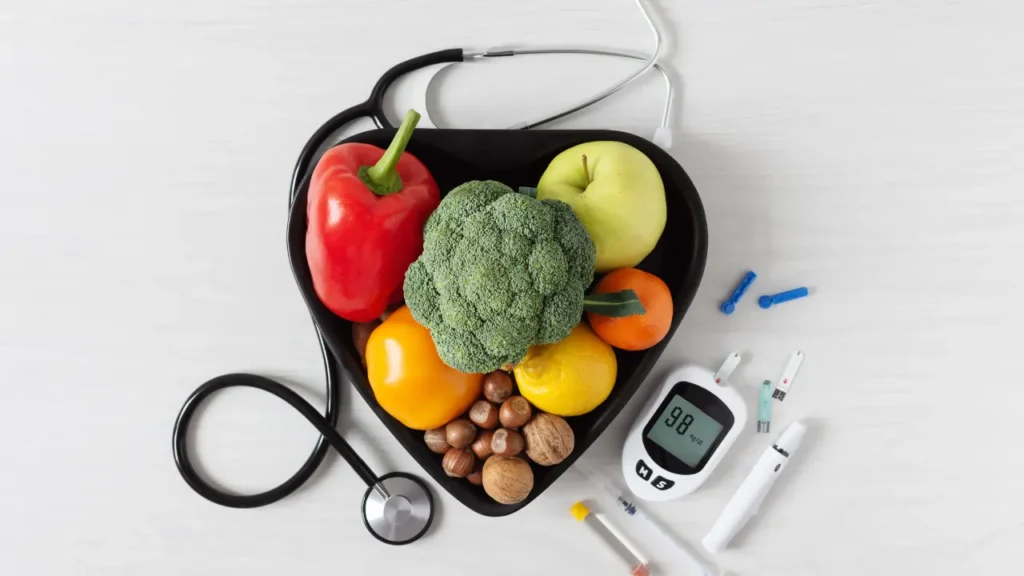Diabetes is no longer just a big-city issue. In Bareilly, cases of Type 2 diabetes are rising at an alarming rate. From young adults to the elderly, more people are facing blood sugar-related complications than ever before.
But what makes the situation worse? Many people don’t even know they have diabetes until serious symptoms appear—like vision problems, nerve damage, or kidney issues.
Bareilly needs more awareness and better access to early diagnosis and expert care.
That’s where Vansh Hospital in Bareilly steps in. With a team of experienced specialists and 24/7 medical support, the hospital provides modern, end-to-end diabetes care—from diagnosis to long-term management.
Table of Contents
Understanding Diabetes: Types & Symptoms

Diabetes is a long-term condition that affects how your body uses blood sugar (glucose). Glucose is a vital source of energy. But when your body doesn’t manage it well, it can lead to serious health issues.
Let’s break down the three main types of diabetes and the symptoms you shouldn’t ignore.
1. Type 1 Diabetes
This type usually appears in children or young adults, though it can happen at any age. It’s an autoimmune condition where the body attacks insulin-producing cells in the pancreas.
Key Facts:
- The body produces little or no insulin
- Requires daily insulin injections
- Symptoms appear suddenly
Common Symptoms:
- Sudden weight loss
- Excessive thirst
- Frequent urination
- Constant hunger
- Fatigue
- Blurry vision
2. Type 2 Diabetes
This is the most common form of diabetes. It usually develops in adults, but younger people are now getting it due to poor lifestyle habits.
Key Facts:
- The body becomes resistant to insulin
- Often linked to obesity, inactivity, and genetics
- May be managed with diet, exercise, or medication
Common Symptoms:
- Increased thirst and urination
- Unexplained weight gain or loss
- Slow-healing wounds
- Numbness in hands or feet
- Frequent infections
- Fatigue
3. Gestational Diabetes
This type affects some women during pregnancy. It usually goes away after delivery, but it increases the risk of developing type 2 diabetes later.
Key Facts:
- Develops during the second or third trimester
- Hormonal changes affect insulin use
- Requires monitoring during pregnancy
Common Symptoms:
- Often no symptoms — detected through routine screening
- Sometimes increased thirst or frequent urination
Why Early Detection Matters
Many people live with undiagnosed diabetes. If left untreated, it can damage the heart, kidneys, eyes, and nerves.
If you notice any of these symptoms, don’t wait.
Talk to your doctor and get a simple blood sugar test.
Comprehensive Diabetes Assessment
A diabetes diagnosis is just the beginning. To manage it properly, you need a full health check — not just a random sugar test.
A comprehensive diabetes assessment helps doctors understand how diabetes is affecting your overall health. It also guides treatment decisions and helps prevent future complications.
1. Blood Sugar Tests
These are the core of any diabetes check-up:
- Fasting Blood Glucose: Measures sugar levels after 8 hours of no food.
- Postprandial Blood Sugar: Taken 2 hours after a meal to see how your body handles sugar.
- HbA1c Test: Shows your average blood sugar levels over the last 3 months.
These tests help your doctor know if your sugar is well-controlled or not.
2. Kidney Function Test
Diabetes can damage your kidneys over time. Regular tests like:
- Serum Creatinine
- eGFR (Estimated Glomerular Filtration Rate)
- Urine Microalbumin
…help detect early signs of kidney trouble.
3. Cholesterol & Heart Health Check
People with diabetes have a higher risk of heart disease. So, doctors often check:
- Total Cholesterol
- LDL (bad cholesterol)
- HDL (good cholesterol)
- Triglycerides
- Blood Pressure
Managing these numbers helps protect your heart.
4. Eye Examination
Diabetes can damage the blood vessels in your eyes (diabetic retinopathy). A yearly dilated eye exam helps spot problems before they cause vision loss.
5. Foot Examination
Nerve damage in the feet is common with diabetes. A simple foot check can prevent wounds, ulcers, and infections. Look for:
- Numbness or tingling
- Skin color changes
- Sores that don’t heal
Your doctor might use a monofilament or tuning fork test.
6. Dental Check-Up
High sugar levels can lead to gum infections and tooth decay. Regular dental visits help keep your mouth healthy.
7. Weight & BMI Measurement
Monitoring your weight and Body Mass Index (BMI) helps assess your risk and guide treatment.
Why It Matters
A full assessment gives you and your doctor the full picture. It’s the first step toward better control, fewer complications, and a healthier life.
Tip: Don’t wait for symptoms. Get checked every 3–6 months or as advised by your doctor.
Diabetes Management Tips

Proper management of diabetes is key to avoiding complications like nerve damage, kidney failure, and joint pain. Below are expert-backed strategies that work best, especially when supported by medical professionals like those at Vansh Hospital Bareilly.
Sample Diabetes-Friendly Daily Diet Plan
| Time | Food Options |
|---|---|
| Morning | Oats porridge, almonds, unsweetened tea |
| Mid-morning | One fruit (guava/apple), green tea |
| Lunch | Brown rice, dal, mixed vegetables, salad |
| Evening | Roasted chana, sprouts, lemon water |
| Dinner | Multigrain chapati, paneer curry, spinach |
1. Eat a Diabetes-Friendly Diet
A good diet helps control blood sugar levels and reduces long-term health risks.
Recommended Foods:
- Whole grains (brown rice, oats, barley)
- Leafy greens and non-starchy vegetables
- Lean protein (tofu, paneer, eggs)
- Low-GI fruits like berries, apples, and guava
- Unsweetened herbal teas
Avoid:
- Refined sugar
- White bread, white rice
- Packaged and fried snacks
- Sugary beverages
Learn more about Glycemic Index and its role in diabetes care.
2. Exercise Regularly
Physical activity improves insulin sensitivity and helps maintain a healthy weight.
Safe & Effective Workouts for Diabetics:
- Brisk walking – 30 minutes daily
- Yoga and deep breathing
- Low-impact strength training
- Physiotherapy for joint stiffness (Available at Vansh Hospital Physiotherapy Unit)
Learn Exercise and insulin sensitivity
3. Monitor Blood Sugar Levels
Regular monitoring helps track treatment progress and prevents emergencies.
Tips:
- Use a glucometer to check fasting and post-meal glucose levels
- Keep a daily log to show your doctor
- Watch for signs of hypo- or hyperglycemia
Learn how Blood glucose monitoring works.
4. Take Medications on Time
Skipping or irregular medication increases your risk of complications.
Common Medications:
- Oral antidiabetic drugs (e.g., Metformin)
- Insulin therapy for Type 1 or advanced Type 2
Always follow your doctor’s dosage instructions. Vansh Hospital offers on-site consultation and pharmacy support.
Understand Insulin therapy
5. Foot and Joint Care
Diabetes can damage nerves and blood flow, especially in the feet and joints.
Orthopedic support at Vansh Hospital helps with:
- Diabetic foot screening
- Custom orthotic footwear
- Treatment for joint pain & mobility issues
- Nerve pain relief and wound healing support
Explore Orthopedic Services at Vansh
Read more about Diabetic neuropathy and Foot ulcers
6. Manage Stress & Sleep
Stress affects hormone levels and can spike your blood sugar.
Tips:
- Practice meditation or deep breathing
- Sleep at least 7–8 hours per night
- Avoid screens before bedtime
Vansh Hospital offers lifestyle counseling to help you stay balanced.
Blood Sugar Control Strategies
Managing blood sugar is the backbone of diabetes care. Whether you’re dealing with type 1, type 2, or prediabetes, these proven strategies can help stabilize your glucose levels and prevent long-term complications.
1. Follow a Consistent Meal Schedule
Eating at regular intervals prevents blood sugar spikes and crashes.
- Don’t skip meals
- Eat every 3–4 hours
- Stick to similar portion sizes daily
2. Choose Smart Carbs
Not all carbohydrates are equal. Focus on complex, high-fiber carbs.
| Good Carbs (Recommended) | Carbs to Limit |
|---|---|
| Whole grains (brown rice, oats) | White bread, white rice |
| Vegetables | Sugary cereals |
| Legumes (beans, lentils) | Packaged snacks |
| Fruits with skin (apple, berries) | Fruit juices, soft drinks |
3. Stay Active Daily
Exercise helps your body use insulin more effectively.
- Aim for at least 30 minutes of physical activity five days a week
- Walking, swimming, cycling, and yoga are excellent choices
- Avoid sitting for long periods — move every 30–60 minutes
4. Monitor Your Blood Sugar
Regular checks help you understand how food, exercise, and stress affect your sugar levels.
- Use a glucometer or continuous glucose monitor (CGM)
- Track fasting and post-meal readings
- Share your log with your doctor during checkups
5. Control Stress Levels
Stress can raise your blood sugar unexpectedly.
- Practice deep breathing or meditation
- Engage in relaxing hobbies
- Try counseling or therapy if needed
6. Stay Hydrated
Drinking enough water helps flush out excess sugar from the blood.
- Aim for 8–10 glasses of water per day
- Avoid sugary drinks like sodas, energy drinks, or flavored teas
7. Get Enough Sleep
Poor sleep can worsen insulin resistance.
- Aim for 7–9 hours of sleep per night
- Avoid caffeine and screen time before bed
- Keep a consistent sleep schedule
8. Limit Alcohol & Quit Smoking
- Alcohol can cause unpredictable blood sugar swings
- Smoking increases the risk of heart disease and nerve damage in diabetics
9. Take Medications as Prescribed
If you’re on medication or insulin:
- Don’t skip doses
- Take them at the same time daily
- Talk to your doctor before making any changes
Quick Tips Recap:
✅ Eat balanced meals
✅ Track your sugar regularly
✅ Move your body daily
✅ Sleep well
✅ Manage stress
✅ Follow your medication plan
Need help with personalized diabetes counseling or meal planning?
📞 Contact Us today to book an appointment with our diabetes care experts.
When to Consult Vansh Hospital Orthopedic Department
Many people don’t realize that diabetes affects more than just blood sugar. Over time, it can severely damage nerves, muscles, and joints—especially in your legs and feet.
If you have diabetes and experience any of the following, it’s time to consult an orthopedic specialist:
Signs You Shouldn’t Ignore
- Numbness or tingling in your legs or feet
- Pain while walking or standing
- Swollen or deformed joints
- Non-healing wounds or ulcers on your foot
- Burning sensation in your lower limbs
- Loss of balance or frequent falls
These could be early signs of diabetic neuropathy or joint degeneration—both of which need immediate attention.
How Vansh Hospital Helps
The Orthopedic Department at Vansh Hospital is equipped to handle diabetes-related complications with:
- Expert orthopedic consultations
- Foot screening and diabetic ulcer care
- Customized support for mobility and joint issues
- Coordination with internal medicine and endocrinology teams
- Surgical interventions when necessary
Early orthopedic care can prevent serious complications, including amputations. Don’t wait until the pain becomes unbearable.
👉 Schedule an orthopedic check-up today and protect your mobility for the long term.
Final Thoughts
Diabetes isn’t just about high blood sugar. If left unmanaged, it can lead to nerve damage, heart issues, vision loss, and even limb amputations.
The good news? It’s manageable—if you take the right steps at the right time.
Whether you’ve been recently diagnosed or are living with diabetes for years, personalized care matters. Bareilly residents now have access to expert treatment right at home—without needing to travel to metro cities.
Vansh Hospital in Bareilly offers complete diabetes care, including:
- Early screening and lab tests
- Personalized diet and treatment plans
- Regular glucose and HbA1c monitoring
- Specialized orthopedic care for diabetic complications
Don’t wait for symptoms to get worse. Take control of your health today.
👉 Book your consultation now or visit Vansh Hospital for expert diabetes care in Bareilly.

